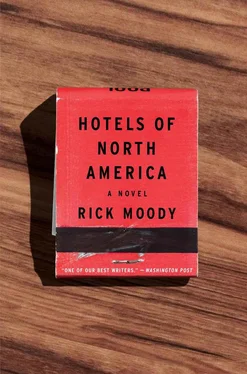Masseria Salinola, Strada Provinciale 29, KM 1, 5, Contrada Salinola, Ostuni, Italia, July 1–16, 2000
Things can go wrong during your vacation. For example, you could suffer a detached retina, which is a very serious condition and requires surgery. It is also possible that during your vacation, upon boarding the cruise liner or while changing planes in Geneva, you could begin to exhibit the symptoms of a bleeding ulcer, resulting in a sudden drop in blood pressure. (I believe there are hemoglobin issues as well, due to the acute decrease in blood volume secondary to a massive upper-GI bleed, or that is my understanding, though I am not a medical professional.) And sometimes people have little strokes; you know, not terribly complex strokes, but just little strokes where they have temporary aphasia and can’t repeat numbers in the correct order. You could experience one of these very disturbing phenomena on your vacation. This could be your fate. (Or, as I have related elsewhere, your passport could be lifted from your pocket by Carpathian-speaking youths.) It is impossible to plan for all these difficulties. Why not stay home? But if instead of staying home, you insist on going on vacation, then this entry, about agroturismo in Italia, is for you.
In 1999, I was helping to conduct wine-tasting classes for a friend who had organized a number of trips in which foreign travel and wine-tasting went together, and I agreed to go along and serve as a wine expert, though I am not a wine expert. At first I thought it was going to be in Tuscany, and for months I went around saying I was going to Tuscany, and then it turned out that it was not Tuscany at all, but Puglia, which I believe was Mussolini’s homeland. Puglia is not exactly cosmopolitan Europe — there are not cutting-edge runway shows there — but it is attractive in a Pleistocene sort of way. Puglia eliminated malaria only recently, you know, and basically what it does is produce olives and olive oil and a few other things, orecchiette, very good mozzarella, etc., and so the farms of Puglia established this agroturismo in order to try to create a market for tourists in the region.
The idea was simple: You go and live on a working farm for a few days, and you get to sample the wares of the farm, in the process learning how cultivation and animal husbandry are practiced in another part of the world. I know that some of you are probably thinking about farms in the United States and imagining traveling to that farm in Iowa that has a toxic sludge lake of pig waste that’s several miles long, where the sounds of pigs having their testicles cut off ring abundantly through the air each spring. I had the same kinds of thoughts about this trip but they were unwarranted. It was not as bad as all that! The farms in Italy are a great deal more attractive. What were those flowers that lined the road? They were like frangipani or bougainvillea, some miracle that bloomed everywhere in the still silent countryside of Italian cultivation. I’d brought my wife, because how often did one get a free trip to Italy, and they were willing to cover my wife and two weeks in Italy, and while I would not get paid, I would get the trip. I needed the money, and yet it was the free trip with which I won over my wife. Ostuni, the town nearby, is called the “White City” because it is all bleached and Mediterranean. It could have been built at any time, the alleys empty and cobblestoned, and you could feel the moisture from the sea, the centuries of occupation in Puglia, the way its fortunes had twisted and turned with a range of imperial masters, the Cyrillic on the buildings here and there. Who would not have wanted to take a crack at Puglia?
At last we arrived at the farm, which dated back to the seventeenth century, or at least that was what we gathered from the sparse literature available in English and the gesturing of the rather truculent proprietor. He had a sort of Ernest Borgnine rubberiness to his face, but without the mugging and grinning. He answered yes to each and every question, even those questions that manifestly required answers in the negative, and if you tried to trip him up by asking him a question and its obverse in rapid succession, he would say yes to each anyhow and then quickly slip away before you bore down. At a certain hour in the morning, he and his brothers, or so we presumed the other men to be, would set off for the olive groves with their tractor and be gone for the day, though I never saw any olives being brought back later. Sometimes it felt as though we were staying on an olive-grove film set rather than in an actual olive grove.
Did I mention that the farm was a ruin? I’m going to say that the last wholesale renovation was probably during the early nineteenth century, before Italy was unified. There were a number of small, nearly windowless cells in which we were meant to conduct our wine-tasting classes, always at the end of narrow corridors to which you arrived via winding staircases, and in all of these rooms, cracks in the stonework overspilled with moisture and, one assumes, a bounteous harvest of mold. There was also a chapel at one end of the courtyard, which no one visited at all, and which was haunted. We were told by our guide that there were some bones underneath the chapel, though whose bones they were was never made clear. Inside the courtyard, the grass and scrub had been allowed to grow up without restraint, in a way that demonstrated the neglect like almost nothing else, and yet in the centermost courtyard, the sanctum sanctorum, there was a birdcage, which, despite the general disorder and lassitude of the place, was always inhabited by a pair of partridges, or pheasants, clucking and pecking at the tin floor beneath them.
No one but our group of wine-tasting Americans seemed to be staying at the farm, and so there were two tables at dinner, which was always outdoors, under the stars, and one table was the famiglia and the other table was the Americans. The dinners were at least three hours long every night and came with endless amounts of wine. There was always an antipasto, a pasta course, a second pasta course, a meat course, a salad course, and dessert. I was usually ready to go to bed after the antipasto. The wine tasters — mostly fine upstanding citizens of suburbs of the United States with a generous capacity for European pretenses, people who went to the ballet, or wore berets, or had children who were experts on Jane Austen — were ready to drink some wine, and even though Italian wine is not known to be as culturally exacting as French wine, it was all part of this experience for them, the wine, the food, the fragrance of the Adriatic, the fresh olives of a sort you have never tasted in your life. They would all hit the wine hard, and it did not take long into the two weeks we all spent together for certain marriages that had seemed rock-solid at the outset, like that of Brenda and Dave McAllister, a couple from Indianapolis who had been to Italy together three times, to unravel. It became clear that Dave’s inability to let his wife finish a sentence had taken a real toll on her, and Brenda rolled her eyes at him the more drunk he got, and once, barely out of earshot, she made a joke about asphyxiating him.
Only a few nights elapsed before I was leaving dinner early with the excuse of preparing the next day’s lecture and discussion while really I was leaving my wife there with the Midwestern culture experts and going back to our room to watch Italian programming on a thirteen-inch television with a coat-hanger antenna. At one time, our room had been the rabbit hutch. Probably I am interpreting the specific wording in my own way, but the word rabbit was definitely employed. The rabbit hutch, like its chimney, was essentially open-air, and if you opened a window in the midsummer heat, you found there were no screens on the windows. We were told, when we asked, that there were screens— Yes! We will fetch them, yes! — but no screens materialized, and here in the land of only recently eradicated malaria, the local mosquitoes descended on us with a force such as I have rarely encountered. Every night at dusk there was a swarm around my head, and the swarm stayed until morning unless I pulled the sheets over me entirely. Eventually I needed to come up for air. My upper lip swelled from the volume of clotting agent injected into it by the mosquito hordes, and I had to give one or two classes looking like a boxer fresh from some KO.
Читать дальше












